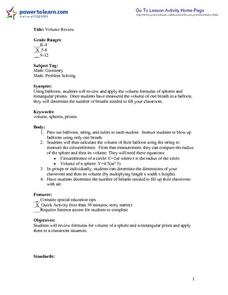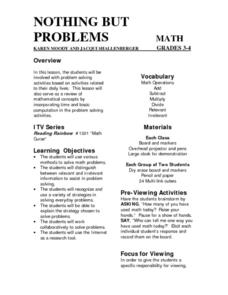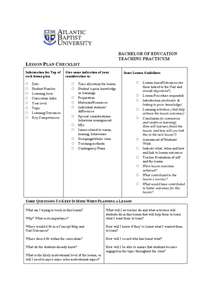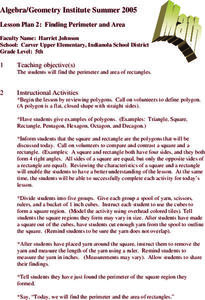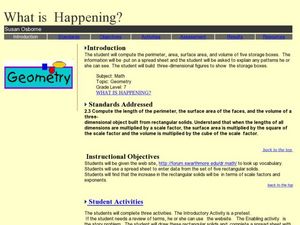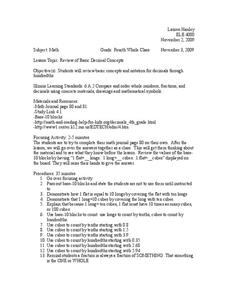Curated OER
Surface Area of Cubes and Rectangular Prisms
Eighth graders calculate surface area of 3-D shapes. In this geometry lesson, 8th graders analyze cubes and prisms by finding their area and surface area. They compare the data of these two shapes.
University of Utah
Geometry Part 2: Measurement in 2- and 3-Dimensions, Plane Sections of Solids
What kind of tree does a math teacher climb? A geometry! Here is a lesson that includes all the geometry resources you could ever wish for in one comprehensive workbook. Class members demonstrate what they have learned by...
Curated OER
Place Value
Third graders review place value by arranging four numbers to make the highest number possible. They are shown a hundred flat. Students are asked to show another way of making 100 using base-ten blcoks. They are then shown a thousands...
Curated OER
Five Senses Lesson Plan
Students listen to The Brave Little Monster, by Ken Baker. In this five senses lesson, students identify the different senses that characters experience in the book they are listening to. They review the senses as a class with hands on...
Curated OER
Volume
Students, after reviewing the measuring of the lengths of sides of different shapes along with the calculation of their perimeters and areas, encounter what it means by the 'perimeter' of a polygon. They practice measuring units of...
Curated OER
Volume Review
Students investigate the concepts of volume for rectangular prisms and spheres. They measure the volume of one balloon and then consider how many breaths it would take to fill the room with balloons. The rectangular prism being measured...
Curated OER
Weathering Rocks
Here is a geology lesson that is sure to get your charges excited. It's all about the process of weathering of rocks. Learners study natural events that can cause rocks to break apart. Some of these events are: ice wedging, plant...
Curated OER
Nothing But Problems
Here is a fabulous lesson on problem solving in the mathematical world. In it, third and fourth graders get lots of great coaching on how to approach word problems, and how to best find a solution. They watch an episode of Reading...
Curated OER
Is Bigger Always Better?
Explore rational numbers with the young mathematicians in your class. They will investigate decimals, fractions, and percents before ordering and comparing rational numbers. This multi-day unit includes differentiation activities and...
Curated OER
How Many Raisins?
Young scholars study the concept of addition. They create verbal number stories with numbers from one to five. They draw a slice of bread with a line down the middle and cut the bread shapes out of a "slice of bread" and a handful of...
North Carolina State University
Shapes
Expose youngsters to 3-D objects in a hands-on learning activity involving marshmallows and toothpicks. Engage your young mathematicians by introducing them to 3-D shapes by means of a story book. Explore 3-D shapes by manipulating...
Curated OER
Rounding Decimals
Fourth graders engage in a lesson that is about the concept of rounding decimals. They review place value and focus it upon the practice of rounding. Students use 10 base decimal grids or models to help make connections with the skill.
Curated OER
Interesting Integers and Exciting Equations
An 80-page resource provides four lessons and all associated worksheets to teach middle schoolers about expressions and equations. The lessons are hands-on, using games, "integer chips," a balance and cubes, and cut and paste activities....
Curated OER
Living in a Geometrical World
Learners participate in a series of hand-on, online, and multimedia activities to examine 2 dimensional and 3 dimensional shapes. They describe common geometric solids. They construct rectangular prisms using straws and ribbon.
Curated OER
Fibonacci II
Study Fibonacci sequences and see a related set of numbers. Learn and review Lucas numbers and use of quadratic equations to find a general term of a sequence of numbers that is generated by a recurrence relation similar to Fibonacci's.
Curated OER
2 Cubed
Students recognize the many kinds of knowledge we all have. They develop recognition and foster self-esteem. They log on to SparkTop.org and play 2 Cubed, an online trivia game that they play one-on-one with an opponent. They identify...
Curated OER
Finding Perimeter and Area
Geometers find the perimeter and area of rectangles. They discuss the definitions and characteristics of rectangles and squares. In groups, they use yarn to discover the perimeter of squares and rectangles. They count cubes to explore...
Curated OER
Discovering Math: Computation
Middle schoolers add, subtract, multiply, and divide rational numbers. They find the square and the cube of numbers. They create a game incorporating computation on rational numbers. Everyone works together to write and evaluate...
Curated OER
Volume of a Rectangular Prism
Children use the length, width, and height of an object to calculate the volume of a rectangular prism. They observe how to multiply three numbers at a time, and define volume. Pupils observe as the teacher demonstrates how to determine...
Curated OER
What is Happening?
Review area, perimeter and volume using this lesson. After reviewing key vocabulary relating to these concepts and answering story problems, learners compute the perimeter, area, surface area, and volume of five storage boxes.
Curated OER
Try Tessellation
Most middle schoolers probably feel that quilting is at best an activity left to their grandmothers. This instructional activity uses the Zome modeling system to get them to realize how shapes in quilting are really tessellations and...
Curated OER
Subtraction Shopping
Students subtract two digit numbers. They check each other's answers for accuracy.
Curated OER
Guess the Color
Young scholars draw colored blocks from a bag and determine the probability of each color being drawn. Then they draw blocks from another bag in which the numbers of each color are unknown. They guess the number of each color included...
Curated OER
Decimal Concepts
Fourth graders complete a journal page to review decimal concepts. In this decimal instructional activity, 4th graders use manipulatives to represent decimal amounts. Students complete a homework sheet related to decimal and...







